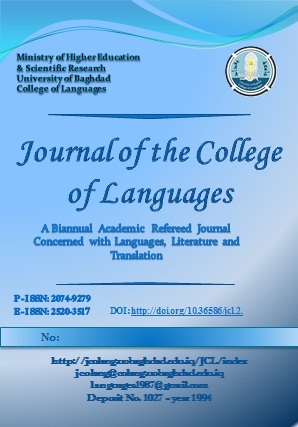الضمائر الشخصية الانكليزية بوصفها إستراتيجية للمناورة في الخطاب السياسي : تحليل نقدي للخطاب
DOI:
https://doi.org/10.36586/jcl.2.2021.0.44.0001الكلمات المفتاحية:
التأثير الايدولوجي, مفهوم المربع الإيديولوجي, المناورة, الخطاب السياسي , الضمائر الشخصيةالملخص
المناورة مفهوم خطابي تؤدي دورا أساسيا في الخطاب السياسي التي بوساطتها يتمكن السياسيون من فرض نفوذ معين على متلقي الخطاب عند استعمال سمات لغوية, ومن أهمها الضمائر الشخصية (فان دايك,1995). تهدف هذه الدراسة الى استقصاء الطريقة التي يوظفها السياسيون في استعمال الضمائر الشخصية و تحديدا الضميرين ’نحن‘(WE) و ’أنا(I)‘، فضلا عن صيغ التملك التابعة لهما ، بوصفها وسيلة للمناورة تستهدف إدراك المتلقين القائمة على مفهوم المربع الإيديولوجي لفان دايك (( Ideological Square الذي يشير الى تقديم الذات تقديما ايجابيا و تقديم الآخرين تقديما سلبيا. و لتحقيق اهداف الدراسة ، اختير خطاب حالة الاتحاد State of the Union)) لعام 2020 للرئيس الامريكي دونالد ترامب ليكون مادة للتحليل. و جرى تحليل (8 )امثلة من مجموع 226 مقتطفا من خطابه الذي تضمن استعمال هذه الضمائر مع دلالاتها نوعا وكما . تظهر النتائج إن الرئيس ترامب يوظف تلك الضمائر لممارسة تأثير آيديولوجي على متلقيه وفي الاساس تقديم ذاته تقديما ايجابيا . وتخلص الدراسة الى ان ترامب يوظف الضمائر الشخصية بوصفها موشرا وظيفيا لمفهومي الروح الجماعية collectivity))أو القوميةnationalism) (، أوموشرا للمسؤولية المباشرة او المشاطرة مع الآخرين. إن نتائج الدراسة من شأنها أن تساعد اللغويين و المحللين السياسيين على فهم الكيفية التي يوظفها السياسيون في استغلال الخصائص اللغوية في لغاتهم تحقيقا لأهدافهم بطرق المناورة .
المراجع
- Barnhill, A. (2014).What is manipulation. In Coons, C., & Weber, M. (Eds.), Manipulation: Theory and practice (pp.50, 72) Oxford University Press.
- Beard, A. (2000). The language of politics. London: Routledge.
- Blass, R. (2005). Manipulation in the speeches and writings of Hitler and the NSDAP from a relevance theoretic point of view. In de Saussure, L., & Schulz, P. (Eds.), Manipulation and Ideologies in the Twentieth Century. Discourse, language, mind (pp.169-190). Amsterdam: John Benjamins Publishing Company.
- Bramley, N. R. (2001). Pronouns of politics : The use of pronouns in the construction of “self” and “other” in political interviews (Doctoral dissertation). Australian National University, Australia.
- Danler, P. (2005). Morpho-syntactic and textual realizations as deliberate pragmatic argumentative linguistic tools. In de Saussure, L., & Schulz, P. (Eds.), Manipulation and ideologies in the twentieth century: Discourse, language, mind (pp. 45-60) (Vol. 17). John Benjamins Publishing.
- Handelman, S. (2009). Thought Manipulation: The Use and Abuse of Psychological Trickery. Santa Barbara, California. Greenwood Publishing House.
- Kamil, S. I., & Al-Hindawi, F. H. (2017). The Pragmatics of Manipulation in British and American Political Debates. Anchor Academic Publishing.
- Nordlund, M. (2003). Linguistic Manipulation: An analysis of how Attitudes are Displayed in News Reporting. Retrieved from:
- https://www.divaportal.org/smash/record.jsf?pid=diva2%3A1026715&dswid=-9436 (7/5/2020).
- Paltridge, B. (2012). Discourse analysis: An introduction(2nd ed.).Bloomsbury Publishing.
- Ponomarenko, E. B. (2013). Linguistic manipulation devices (by the example of English and Russian information texts). GISAP. Philological sciences, (1), 62-64.
- Van Dijk, T. A. (1995).Ideological discourse analysis. In Eija Ventola and Anna Solin (Eds.), Special issue interdisciplinary approaches to discourse analysis (pp. 135-161). University of Helsinki: English Dept.
- Van Dijk, T. A. (2006a).Discourse and manipulation. Discourse & society, 17(3), 359-383.
- Van Dijk, T. A. (2006b).Ideology and discourse analysis . Journal of Political Ideologies, 11(2), 115-140.
- Wilson, J. (1990). Politically Speaking. The Pragmatic Analysis of Political Language. Oxford: Basil Blackwell.
- Yule, G. (1996). Pragmatics. Oxford: Oxford University Press.











